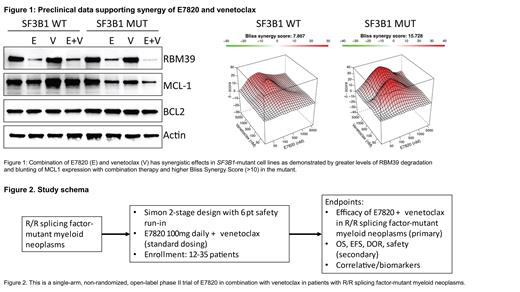*JPB and NSC contributed equally.
Background and Significance: Mutations in RNA splicing factor genes ( SF3B1, SRSF2 U2AF1 and ZRSR2)are common in patients with acute myeloid leukemia (AML) and myelodysplastic syndromes (MDS). We and others have previously shown that pharmacologic degradation of the RNA splicing factor RBM39 preferentially kills splicing factor mutant cells. These preclinical data provided the rationale for a recently completed phase II clinical trial (NCT05024994) of the oral RBM39 degrader E7820 in patients with relapsed or refractory splicing factor mutant MDS or AML. The safety and efficacy data of this trial have been presented previously (Bewersdorf et al ASH 2022). The generally favorable safety profile and correlative studies confirming target engagement and induction of mis-splicing events support the further exploration of E7820 in the context of combination therapies. Recent clinical data show that treatment with venetoclax can overcome the negative prognostic impact of splicing factor mutations in AML (Senapati et al, Blood 2023). Additionally, preclinical data from our laboratory show synergy between E7820 and venetoclax in SF3B1-mutant isogenic cell lines leading to enhanced RBM39 degradation and blunting of MCL-1 expression, a common cause of venetoclax resistance ( Figure 1). Dynamic BH3 profiling of E7820 in myeloid leukemia cell lines suggests an E7820 dose-dependent priming for BAD which implies forced reliance on BCL2. Furthermore, adding venetoclax to E7820 further increased mitochondrial priming. Preclinical animal modeling with patient-derived xenografts (PDX) is ongoing. Based on these preclinical data, we are amending the study to include a separate arm of E7820 in combination with venetoclax.
Methods and Study Design: This is an investigator-initiated, phase II trial (NCT05024994) that is being conducted at Memorial Sloan Kettering Cancer Center and Sylvester Comprehensive Cancer Center at the University of Miami of adult (≥18 years) patients with relapsed or refractory AML, MDS, or chronic myelomonocytic leukemia (CMML). Patients must have a hotspot splicing factor mutation in SF3B1, SRSF2, U2AF1 or U2AF2 (with hotspot mutations as defined by OncoKB) or a nonsense or frameshift mutation in ZRSR2 detected within 6 months of study screening for enrollment. Patients are required to have adequate end-organ function and an Eastern Cooperative Oncology Group (ECOG) performance status of ≤3. Prior treatment with venetoclax is permitted.
Patients enrolled in the new combination arm will receive E7820 100mg by mouth once daily + venetoclax orally once daily on days 1-28 of cycle 1 on days 1-21 of subsequent cycles. The study design is shown in Figure 2. As this combination has never been studied in human AML and MDS patients previously, the study will include a 6-patient safety run-in phase with an optional dose de-escalation of E7820 to 70mg orally once daily. The sample size is based on a Minimax Simon 2-stage design. Assuming a type I error rate of 0.05, power of 0.8, a response rate of 10% in the historical control group and 30% with E7820 + venetoclax, 15 patients will be enrolled in stage 1. If there are at least 2 responses among the first 15 patients, we will enroll another 10 patients. The null hypothesis will be rejected if there are at least 6 responses in the 25 patients. The primary endpoint of this trial is to evaluate the efficacy of E7820 + venetoclax in patients with relapsed/refractory myeloid malignancies with mutations in splicing factor genes as measured by the response rate within 6 cycles of therapy (AML: complete remission (CR) + complete remission with partial hematologic recovery (CRh); MDS: CR + CRh + CR with limited hematologic recovery (CR-L) + partial remission (PR); CMML: CR + PR). Secondary endpoints include overall and event-free survival. Correlative biomarker and pharmacodynamic parameters will be assessed as exploratory endpoints including effects on RBM39 protein levels, changes in global and key target splicing events, and evaluation of DCAF15 mRNA levels and response to therapy.
Disclosures
Watts:Reven Pharma: Consultancy; Rafael Pharma: Consultancy; Aptose: Consultancy; Takeda: Consultancy, Research Funding; BMS: Consultancy; Daiichi Sankyo: Consultancy; Servier: Consultancy; Rigel: Consultancy; Immune Systems Key: Research Funding. Abdel-Wahab:Harmonic Discovery: Current holder of stock options in a privately-held company; AstraZeneca: Consultancy; Amphista Therapeutics: Consultancy; Minovia Therapeutics: Research Funding; Nurix Therapeutics: Research Funding; Loxo/Lilly: Consultancy; AbbVie, Inc.: Consultancy, Membership on an entity's Board of Directors or advisory committees, Speakers Bureau. Stein:Foghorn: Consultancy; PinotBio: Consultancy; Janssen: Consultancy; Syndax: Consultancy; Abbvie: Consultancy; Genentech: Consultancy; Eisai: Research Funding; Jazz: Consultancy; Menarini: Consultancy; Neoleukin: Consultancy; Genesis: Consultancy; Gilead: Consultancy; Servier: Consultancy; CTI Biopharma: Consultancy; OnCusp: Consultancy; Bristol Myers Squib: Consultancy, Research Funding; Novartis: Consultancy; Calithera: Consultancy; Agios: Consultancy; Daiichi: Consultancy; Blueprint: Consultancy; Aptose: Consultancy; Syros: Consultancy; Astellas: Consultancy; Ono Pharma: Consultancy.


This feature is available to Subscribers Only
Sign In or Create an Account Close Modal